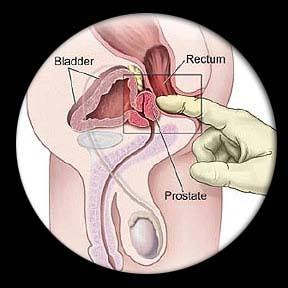Enlarged Prostate
 The prostate is a walnut-shaped small gland located beneath the urinary bladder and is found exclusively in males. It is an organ that goes through two growth periods – during puberty and reaches its adult size by roughly age 20. It Then it remains stable for some time and around the age of 45 resumes its growth process. It often keeps on growing and by old age nearly 80% of males have an enlarged prostate. That is why it is a common issue for older males.
The prostate is a walnut-shaped small gland located beneath the urinary bladder and is found exclusively in males. It is an organ that goes through two growth periods – during puberty and reaches its adult size by roughly age 20. It Then it remains stable for some time and around the age of 45 resumes its growth process. It often keeps on growing and by old age nearly 80% of males have an enlarged prostate. That is why it is a common issue for older males.
The prostate gland assists in production of semen and surrounds the urethra, and when enlarged the bladder becomes irritated from the pressure which causes problems with urine flow and frequency. While urinating function may be impaired due to this condition, sexual function often remains unaffected. It is important to detect abnormal prostate growth as early as possible to increase chances of a potential cure, and as we age, the Digital Rectum Exam should be performed at least once a year.
Symptoms of an Enlarged Prostate
![]() Frequent urination (especially at night)
Frequent urination (especially at night)
![]() Thin urine stream and difficulty urination
Thin urine stream and difficulty urination
![]() A discharge from the penis when urinating
A discharge from the penis when urinating
![]() Burning sensation when urinating
Burning sensation when urinating
![]() Sensation of fullness and stiffness in the rectum
Sensation of fullness and stiffness in the rectum
![]() The feeling of full bladder but inability to begin urinating
The feeling of full bladder but inability to begin urinating
![]() Lower back pain
Lower back pain
![]() Thigh pain
Thigh pain
What causes enlarged prostate?
Aging. The prostate starts to grow again after 40 and unfortunately enlarged prostate is as common among older men as hair loss. So if that makes you feel any better, you are definitely not the only one.
Benign Prostatic Hyperplasia (BPH). Benign Prostatic Hyperplasia is a medical terminology for a non cancerous enlargement of the prostate gland, which is particularly common in older men. More about BPH here.
Cancer of the Prostate. Prostate cancer is the most common type of malignancy in men in the United States and is also one of the most common causes of cancer related deaths in men over the age of 55 yrs. Even though, there is extensive investigation being carried out, the cause of this cancer has remained unknown. But there are several factors that could play major roles. Most prostate cancers arise from the peripheral zone of the prostate which is felt during rectal examination. This cancer is more common in African Americans than Caucasians. More about Prostate Cancer here.
Prostatitis. Prostatitis describes the inflammation of the prostate gland, generally caused by infections (either acute or chronic), but such inflammation may also exist without necessarily having a causative organism. Prostatitis can cause urinary symptoms and impaired ejaculation. More about Prostatitis here.
Help for Enlarged Prostate
Generally the goal of Treatment is to prevent reaching the point of urinary retention, where one can’t urinate at all. Best way to deal with this issue is ideally as early as possible. Usually antibiotics help to slow down the process, however in case with Prostatosis – a condition where that is not infections but simply muscle spasms involving the prostate and surrounding tissue, antibiotics don’t work. In other times doctor may prescribe medications to shrink or relax the prostate or bladder. Soaking in sitz bath and frequent ejaculation are also helpful remedies. Another option is the natural way. There are many clinically proven natural herbal remedies that have been shown to inhibit inflammation and growth of the prostate in a natural manner without unpleasant side effects, such as Epilobium parviflorumand Hypoxis rooperi. In many countries in Europe even very conservative doctors widely prescribe natural remedies as a preventative measure.
Tips for dealing with an Enlarged Prostate
![]() Avoid prolonged sitting as you sit on your prostate. This includes biking.
Avoid prolonged sitting as you sit on your prostate. This includes biking.
![]() Ejaculate frequently, it removes fluid and helps to shrink the prostate.
Ejaculate frequently, it removes fluid and helps to shrink the prostate.
![]() Don’t drink anything before bed, especially soda or caffeine containing drinks.
Don’t drink anything before bed, especially soda or caffeine containing drinks.
![]() Exercise and stay physically active.
Exercise and stay physically active.
![]() Avoid antihistamines and other over-the-counter decongestants and cold remedies, they irritate the prostate.
Avoid antihistamines and other over-the-counter decongestants and cold remedies, they irritate the prostate.
![]() Avoid the cold and wear warm underpants in winter.
Avoid the cold and wear warm underpants in winter.
![]() Soak in a warm bath as this relaxes the prostate.
Soak in a warm bath as this relaxes the prostate.
![]() Massage prostate on a regular basis with a help of prostate massaging device
Massage prostate on a regular basis with a help of prostate massaging device



